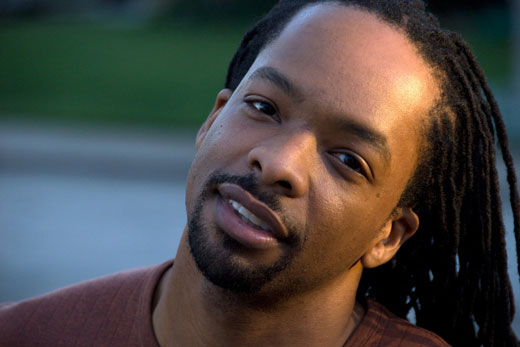Jericho Brown has always thought of writing as participating in a conversation.
As a poet, he is simply posing — and answering — the kind of deeply-felt questions that most intrigue him with a style of lyrical, evocative writing that, he admits, may be felt before it is understood.
A native of Shreveport, La., Brown first came to Emory for summer studies as a 19-year-old United Negro College Fund/Mellon Fellow. During his time on campus, the late Rudolph Byrd, former chair of the African American Studies Department, became "a mentor, an inspiration and a reminder to stay the course," he recalls.
Brown worked as a speechwriter for the mayor of New Orleans before earning a Ph.D. in literature and creative writing from the University of Houston. He also holds an M.F.A. in creative writing from the University of New Orleans.
His debut poetry collection, "Please," won the 2009 American Book Award.
Brown came to Emory last semester as an assistant professor of English and creative writing, teaching both freshman seminars and advanced poetry workshops.
On March 26, he will be the featured speaker at the Feminist Founders Reading at 6:30 p.m. in the Jones Room of the Woodruff Library.
Brown spoke with Emory Report about finding his voice through poetry:
Where does your love of language come from?
I have to trace it back to a mother who really couldn't afford childcare. She would drop my sister and I off at the library whenever she had errands to run. We had no choice but to read. I don't know if the library knew it or not, but they were our babysitters.
What writers do you remember as early influences?
By the time I was 10 years old I had read several of John Updike's novels, Langston Hughes, Nikki Giovanni — so many people whose work still means so much to me. That seed was watered by my experience growing up in the African American church, which is a location of pomp and circumstance and drama and theater. I was very active in the church, a fan of my pastor's oratory. After that, I became interested in writing as a space where you could put things you couldn't necessarily talk about in the grocery story line, but that you knew existed. Things I began to understand that people couldn't talk about but could be written about.
How did poetry emerge in your own writing life?
When I was 16 years old, I had a high school assignment to spend a year writing a research paper. I missed school the day topics were picked, and only one was left: the confessional poets, Sylvia Plath, Robert Lowell and Anne Sexton. I spent a year reading their poems, even though I had no idea what they were talking about. Then I had to read criticism written about their poetry so I could better understand it. I began teaching myself about poetry and my own aesthetic proclivities. From that point on, I think I had the idea I would be a writer of some sort.
Does confessional poetry influence your work today?
I was really taken by the ways in which those poets made themselves vulnerable to their own work, as well as the ways in which they made it clear they were living in a landscape that was not only personal but also political.
That's exactly what I try to do every time I sit down to write a poem. I want to write poems that are not only about me, but also about the world.
You spent time as a speechwriter. What did that give you?
After I graduated from college, I worked as a speechwriter for Marc Morial, who was the mayor of New Orleans (1994-2002) and is now the president of the National Urban League. It was a wonderful opportunity, my first big break and a huge training ground. I learned to work under really stiff deadlines, structuring things and to write every day. Speeches, press releases, ghost writing columns — all kinds of writing in the communications and press office for City of New Orleans.
Poetry became an escape from that kind of writing. I think the big difference was whenever you write a speech you know what will happen, but when you write a poem you don't know. Even things you deeply believe in you may not know any more. So poetry was sort of risky and dangerous. I loved it because of that.
What drew you to Emory's Creative Writing Program?
The personal reasons had to do with wanting to (stay closer to) home and the South. The professional reasons had to do with working with poets like Natasha Trethewey and Kevin Young, which is really an honor for me, because they've always been role models.
One of the things I hope to bring to Emory is the fact that I'm always looking at newer work, younger people, trying to figure out who the up-and-coming voices are, to pick the next Pulitzer Prize winner before they win the next prize, to stay very aware of what's going on in the poetry world throughout the country. People who are emerging give us an idea of what the trends in poetry will be, gives scholars an idea what to look for in our own work.
What are you working on next?
I just found out that my book, "New Testament," as been taken by Copper Canyon Press, the same press that publishes W. S. Merwin, the former (2010) U.S. Poet Laureate, and will be out somewhere between September 2014 and February 2015. I'm excited and have been making final edits. I also just had a poem ("Coliseum") accepted into The New Yorker, which is a poet's dream. So things have been really wonderful for me on the professional front. I'm also thinking of turning away from poetry [and] turning toward prose and writing a longer work of fiction.

